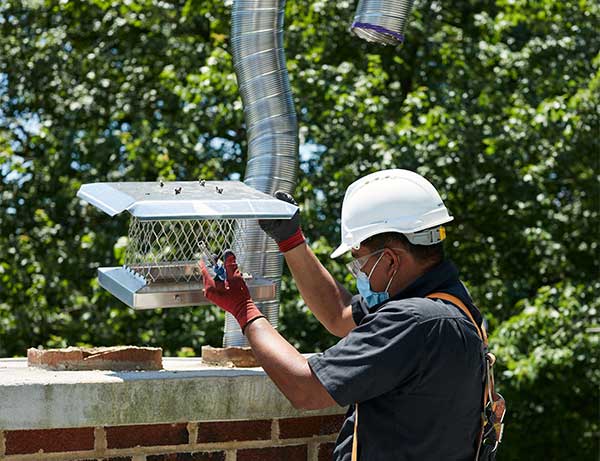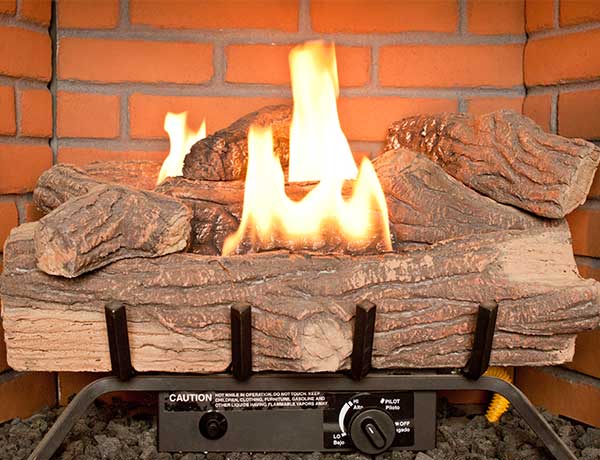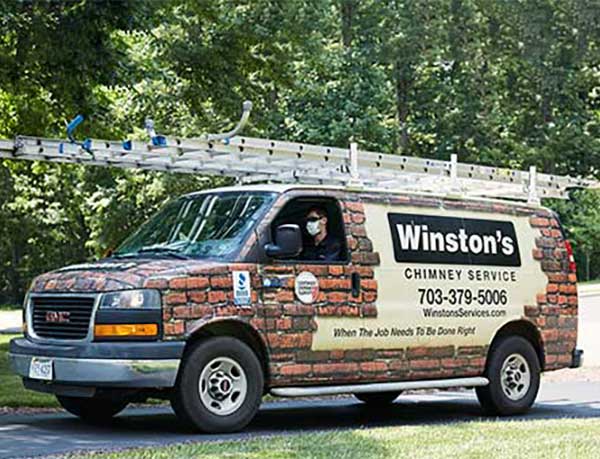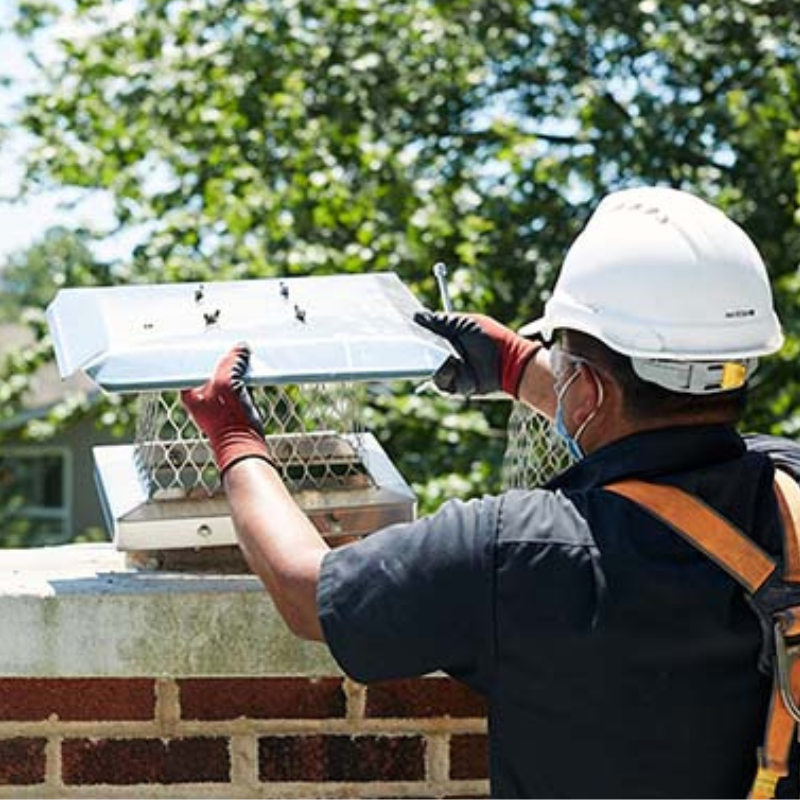For Chimney Leak Repairs, Trust Our Experts Every Time
Water is one of the most threatening elements that can enter your chimney system or fireplace. Leaks in your chimney can erode masonry clay liners, cause rust to form on metal liners (and other metal components), kickstart deterioration throughout the firebox, damage your brickwork significantly, and a whole lot more.
Needless to say, doing everything you can to prevent leaks and keep water from entering your chimney and fireplace is a must – and it’ll be far more affordable than rebuilding and replacing the chimney down the line.
Fortunately, a vigilant homeowner can identify potential chimney leaks before it is too late by booking regular chimney inspections and understanding the potential warning signs.
If you have a home in the Northern part of Virginia, Washington, DC, or Maryland, and suspect a chimney leak – or any other type of chimney or fireplace damage, for that matter – reach out to the chimney repair techs here at Winston’s Chimney Service. We have access to specialized diagnostic tools that, when coupled with our decades of experience, allows us to quickly identify the source of your leaks and take appropriate measures to resolve them.
What Causes Chimney Leaks?
Damaged or Missing Chimney Cap
The chimney cap on your chimney may not seem all that important or significant, but it has the vital role of keeping moisture, debris, and animals out of the inside of your flue – and away from your home. And when it becomes damaged or is missing, outside threats will be able to easily enter.
Caps are extremely affordable investments that will last long (when fitted correctly) and save you tons of stress and money down the line. If your chimney doesn’t have one installed, get our techs out to get it done soon.
Cracked Chimney Crown
A cracked chimney crown is one of the more common culprits behind a leaking chimney. Chimney crowns are slanted concrete or masonry structures that are built at the top of the chimney, where the brickwork ends, and they form a sort of lid or roof that helps keep water away.
Generally, crowns should be sealed with cement mortar, so that water cannot penetrate. However, if major cracks develop over time, moisture will find its way in and cause severe damage. These cracks can occur as a result of improper installation, as well as from very cold and wet weather – which can cause any underlying masonry to crack due to extreme temperature changes.
In the end, if your crown problems are not dealt with quickly, they can eventually lead to significant – and costly – issues.
Damaged Flashing
Flashing plays an important role in keeping water out of the chimney and away from vulnerable areas of the roof – and it keeps your home’s interior better protected too.
When installed properly, your flashing should form a protective waterproof seal around the junction where the roof and chimney meet up. When water starts to seep into cracks or gaps between these two structures, it destabilizes their structural integrity, which could lead to some disastrous outcomes.
When any kind of damage occurs to flashing, or if it was installed incorrectly from the beginning, it creates a gap through which moisture can enter and wreak havoc. Invest in regular inspections and maintenance of your chimney’s flashing to ensure your home remains safer from water-related damage.
Condensation
If too much condensation forms in your flue, it can trigger damage, which then makes your system more susceptible to leaks. But how does this condensation form in the first place?
Well, essentially, the hot fumes and smoke produced by your fire travel up your flue and, once they reach the cooler area near the top of it, they liquify – cue the condensation. This moisture then clings to the walls of the chimney and runs down the masonry and liner system – triggering all kinds of damage along the way (like cracking, deterioration, and more).
The good news is that there are ways to prevent this and help eliminate condensation in your flue. Ask us about what we can offer – many times something as simple as properly insulating your chimney liner or installing a chimney cap on the top of the chimney to reduce exposure to colder weather will do the trick.
Masonry Damage
Masonry damage is one of the most common causes of chimney leaks. It happens when rain seeps through cracks in the brick or mortar that make up the chimney walls and crown. This then invites water to enter the chimney system and fireplace, and it can invite this moisture into the walls and ceiling of the home too.
Once water gets inside, it can cause condensation and other moisture problems, eventually leading to damaged ceiling joists, rafters, electrical wiring, and insulation – not to mention ugly staining on walls and ceilings. Even minor masonry damage can cause major long-term complications down the line.
Fortunately, with proper maintenance and repair services from dedicated sweeps, like us, chimneys can be kept stronger and leak-free for many years.
Poorly Designed or Installed Chimney System
Trusting an expert to handle any new builds or redesigns is a must. Why? Because if a chimney is poorly designed or incorrectly constructed, it can easily lead to water leaks and other types of masonry or chimney damage.
In some cases, the flue liners and flashing materials weren’t correctly fitted to the chimney structure, while other times the wrong materials were used from the start. And sometimes damages are more to do with faulty mortar joints, poorly fitting clay tiles, an incorrectly built crown, or inadequately installed caps or chase covers.
The bottom line is that, if a chimney system is improperly put together, even minor rain events can cause water to leak into the home – resulting in costly repairs, potentially dangerous structural damage, and a lot of stress for the homeowner.
Weather Events
When the weather outside gets crazy, your chimney is left a lot more vulnerable. Events like rain or lightning storms, heavy winds, or blizzards can damage the structure of a chimney and make it a lot more susceptible to leak-related issues.
Even small changes in temperatures can cause condensation and seepage that leads to a leaky chimney. Additionally, any fractures or areas of deterioration in the masonry will be more susceptible to the effects of weathering (like the freeze/thaw process), resulting in various leaks.
How Can I Prevent Chimney Leaks?
One of the first and most important things to ensure is that you have a protective cover called a chimney cap. These are highly effective at not only blocking snow, rain, and other moisture, but for keeping debris and animals out too.
The other thing that must be checked during the annual inspection is the crown. If there are cracks or gaps in the crown or it has pulled away from the chimney sides, water can easily enter the system and cause damage throughout your home.
Another preventive measure that we recommend is investing in water repellent or waterproofing services. For a long time, the fireplace and chimney industry didn’t have a good solution to protecting masonry. They’d just seal it up from the outside, which was good for keeping water at bay, but then eliminated the brick and stone’s ability to breathe.
The exciting thing about newer products is that they allow your structure to vent – while also not allowing water to pass through from the outside. This protects the masonry without inhibiting its ability to do exactly what it needs to do to maintain a properly working system.
And then there’s things like installing or fixing flashing, making any necessary masonry repairs, and keeping things like tree limbs and overhanging branches cut away from the chimney. We find companies that are not chimney-specific tend to overlook some of these areas.
The team at Winston’s is trained and certified, and we live and breathe fireplaces and chimneys. Our goal is to find and fix the problem the first time, every time. We believe, if given the chance, we’ll prove ourselves to you time and time again.
Can I Use My Fireplace if There is a Leak in the Chimney?
If there is a leak in your chimney, we highly recommend not putting the fireplace to use. Not only does this put your home and family at risk (as your system will be more prone to fire hazards and gas leaks), but could also make any pre-existing damage significantly worse.
Remember – the main purpose of a chimney is to provide an opening that allows smoke, noxious gases, and other combustion products created by your fireplace to escape the living space. If there is a crack or a break in the chimney structure, these gases can leak into your home and pose a significant risk to you and any other occupants.
So, get your repairs booked, then have a certified chimney technician inspect the chimney before using your fireplace again.
What Are the Dangers of a Leaking Chimney?
Structural Damage to the Home or Building
A chimney that’s leaking can lead to all kinds of structural damage into a home or business. We’re talking things like staining on the walls and ceilings, wood rot, mold and mildew growth, and more. All of these issues can then lead to crumbling walls, peeling paint, and drooping roofs – which means you’ll be looking at some costly repairs down the line.
The structural stability of the building may become compromised too. Damp conditions around the chimney can cause nails and other metallic building materials to rust and weaken. A lot of these are necessary for framing and support, so you can imagine how things might end = you could be looking at some severe damage if issues are left unchecked.
Further Damage to the Chimney & Fireplace
Well-maintained chimneys and fireplaces can boost a home’s value significantly… but improperly maintained or defective chimney systems can have the opposite effect. These systems will be less likely to stand strong against extreme temperature changes, which will then cause them to crack and deteriorate.
In addition, a chimney that’s damaged won’t function properly or efficiently, leaving your household susceptible to dangers like poor air quality, gas exposure, fire hazards, and more. Have your chimney annually inspected and repaired as necessary by a certified chimney professional to ensure any damage is spotted and corrected before it leads to costly issues.
Mold & Mildew Growth
The presence of mold and mildew in a home can lead to some serious health hazards and damage. Unfortunately, mold thrives in damp and humid environments, making certain areas of the home – especially your dark, damp chimney – a prime target for their formation and spread.
If left unchecked, mold and mildew can cause structural damage to the home by breaking down wood surfaces, fabrics, upholstery, wallpaper, carpets, masonry, and even paint. Mold spores can also trigger health issues by entering the air and causing respiratory ailments like asthma, allergies, or other infections.
Make sure your sweep is inspecting for any signs of mold growth – and quickly take action to stop and prevent it, as needed. Implementing proper ventilation systems throughout the home is an excellent way to keep humidity levels low and prevent growth.
Increased Risk of Fire Hazards
Fire hazards caused by damaged chimney components can have disastrous effects on a home’s structure. Problems like obstructed chimneys, damaged or missing flue liners, and corroded materials can all provide pathways for hot combustible gases to seep into the walls and attic spaces of your home. And if left unchecked, these dangerous gases will weaken load-bearing supports like joists, beams, and trusses as they accumulate in your structure over time.
In addition to this structural damage, the residue that forms from the contact between these gases and combustible surfaces will create a potential fire hazard, increasing the chances of an accidental fire starting in your home. To help prevent these kinds of issues it is recommended to perform yearly chimney inspections and prompt repairs as soon as you notice any damage.
What Is the Best Way to Prevent Chimney Leaks in My Home?
How can you avoid leaks altogether? Well, a chimney inspection should always be done prior to use for the year, and it’s important to choose a qualified professional like the technicians at Winston’s Chimney Service. We can detect possible flue problems, as well as suggest necessary repairs and preventive measures, such as using chimney caps, which help protect the flue from damage caused by wind, rain, and other elements.
Additionally, we will also assess whether it’s time to repair or replace your liner, or possibly even perform water-repellent treatments to further protect your masonry.
In the end, an annual chimney inspection will go a long way toward ensuring that you are preventing costly damages down the road.
We Have the Tools & Knowledge to Help You Out
The best way to prevent chimney leaks in your home is to have Winston’s Chimney Service come out and inspect your chimney on an annual basis. Every one of our technicians is certified by Chimney Safety Institute of America (CSIA) and goes through ongoing training throughout the year to stay on top of the latest technologies in the chimney and venting industries. If you need chimney or fireplace repairs, we’re the team to trust.
Call us at 703-379-5006 or you can schedule your appointment with us online. You’ll be glad you did.
Chimney waterproofing and repellent is one of the best ways to minimize the risk of chimney leaks. Our masonry repair experts really know what they’re doing!




